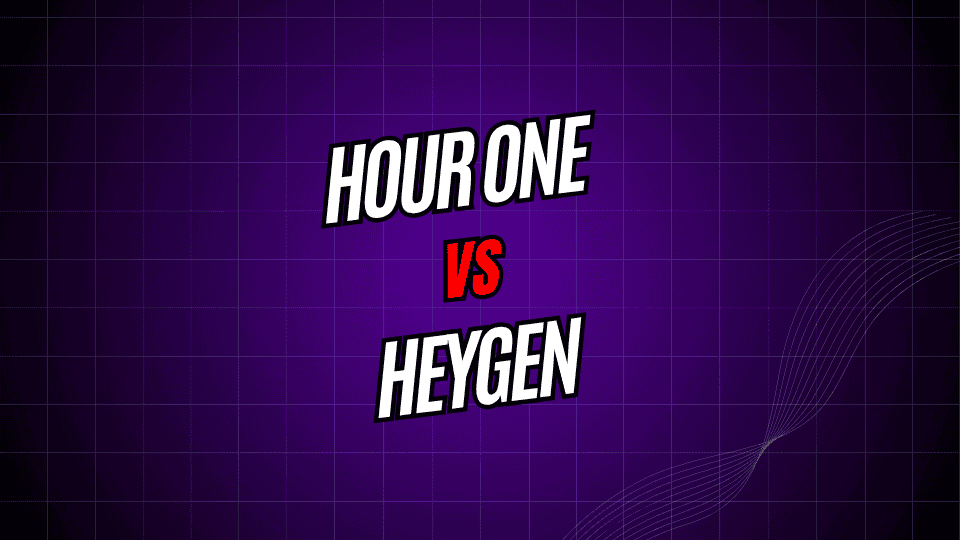
The idea of making movies with robots used to sound sci-fi. Now, businesses use AI tools every day to whip up polished videos without a camera crew or studio lights. Two frontrunners in this field are Hour One and HeyGen, each taking its own spin on how to turn words into moving images.
Although both claim to make video work easy, they really suit different budgets and goals. Hour One leans toward big companies that want deep brand control, while HeyGen wins over solo creators and small teams because its tools feel friendly and its prices are lighter. Knowing what each platform offers can steer you to the one that will level up your online video game.
What is Hour One?
This service bills itself as an enterprise-grade engine built for businesses that churn out lots of content. Hour One specializes in training clips, slick promos, and internal updates that must look professional yet roll off the assembly line fast.
Template Library – The platform comes with ready-to-use layouts for everyday business needs, like employee training, product demos, and company-wide announcements.
Multi-Language Support – Hour One speaks more than 100 languages, so global teams can reach every audience without a hitch.
Brand Customization – Larger clients can build personalized avatars that match their logos and company rules.
Analytics Dashboard – A built-in dashboard shows how each video performs and who watched it, department by department.
Hour One Pricing
Hour One uses custom pricing built around each enterprises needs. Because there are no public price tags, interested companies must ask the sales team for a quote. This model suits bigger organizations with unique demands and larger budgets.
What is HeyGen?
HeyGen keeps things simple, aiming its AI video tools at content creators, small shops, and marketing teams. The service highlights ease of use and fast production while still keeping quality high.
Key Features of HeyGen
AI Avatar Creation – Users can build a custom avatar from their own photo or pick one from the libraries HeyGen already offers. The whole setup takes only a few clicks, so people with no tech skills can do it.
Voice Cloning. HeyGen lets you clone voices, so you can build videos that sound like certain speakers or keep your brands voice steady across projects.
Video Templates. The platform comes with tons of ready-made templates for social media posts, marketing clips, and classroom videos, saving you design time.
Real-Time Generation. Because it works fast, HeyGen often spits out a finished video in minutes, perfect for days when deadlines are tight.
API Integration. Devs can plug HeyGens tools right into their apps and workflows, keeping teams on the same tech stack.
HeyGen Pricing. Pricing is clear and grows naturally with how much you use the service:
- Free Plan. Basic features, videos carry a watermark.
- Creator Plan. $29 per month for solo makers.
- Team Plan. $89 per month for small squads.
- Enterprise Plan. Custom rates for larger companies.
Hour One vs. HeyGen: Feature Comparison.
Video Quality and Realism. Hour One shines in building ultra-realistic avatars ready for boardrooms and big training sessions. Their characters move smoothly, read the room with gestures, and dress the way business expect.
HeyGen also makes strong avatars, but its biggest pitch is speed and ease of use. The characters look good and get the job done, yet they may not have every little detail Hour One packs into its premium models.
Customization Options
Hour One gives companies deep control over avatar design, letting them craft virtual presenters that stick tightly to brand rules. Customers can pick outfits, set backgrounds, and even write special hand motions.
HeyGen also lets users tweak avatars and scenes, but it does so in a cleaner, simpler package. Editors can change looks and layers, yet the choices land well short of Hour Ones enterprise-grade suite.
User Experience
Because Hour One packs so much power, it often asks for tech know-how and a longer setup. Teams that live in video production usually shoulder the extra learning.
HeyGen flips that script, with menus and drag-drops that let anyone build a video in under five minutes. Absolute beginners find the climb to confidence is way shorter.
Integration Capabilities
For larger workplaces, Hour One rolls out heavy-duty links that plug straight into learning systems, content hubs, and corporate chat tools.
HeyGen has lighter API access and a few ready-made hooks, which fit smaller projects and more free-flowing Creative teams.
Use Cases and Target Audiences
When to Pick Hour One
Big Companies: Firms with high-volume video plans and a dedicated crew gain the most from Hour Ones full toolset and deep custom options.
Training Groups: Teams building wide-raging employee programs love its consistent look and polished finish across every lesson.
When to Pick Hour One
Global Organizations: Firms that work in several countries count on Hour Ones big language menu and culture-tailored options.
Heavily Regulated Fields: Businesses in finance, healthcare, or law lean toward Hour Ones tight security and full compliance tools.
When to Choose HeyGen
Content Creators: Solo makers and influencers find HeyGens easy sign-up and low cost a better fit for their workflow.
Small to Medium Businesses: Teams with lean budgets but steady video needs appreciate HeyGens no-frills, clear process.
Marketing Groups: Departments that turn around campaigns and posts fast prefer HeyGens speed and user-friendly setup.
Startups: New ventures value HeyGens open pricing and instant access to all the tools from day one.
Performance and Reliability
Hour One aims for enterprise reliability, backing every client with a dedicated support crew and solid service-level promises. The engine is built to power high-volume studios and every piece of mission-critical content.
HeyGen targets smaller runs, so it spots quick processing and steady uptime for everyday projects. Its not outfitted for enterprise loads, yet it hit the mark time after time for its core crowd.
Support and Resources
Hour One rolls out full support with personal account managers, hands-on training, and onboarding built around each client. Bigger accounts jump the queue and can go straight to the technical team when urgent issues pop up.
HeyGen comes with solid community support, clear docs, and a friendly help desk that usually replies fast. Its backing might not reach the depth of Hour One’s enterprise care, but it meets the day-to-day needs of most creators.
Making the Right Choice for Your Business
Deciding between Hour One and HeyGen boils down to a few key questions:
Budget: HeyGens fixed plans fit tighter pockets, while Hour One’s quote-based model matches larger firms willing to pay for extra features.
Scale: Big teams producing dozens of videos each week may justify Hour Ones deeper toolset, but a smaller crew will likely thrive with HeyGens clean, easy-to-use system.
Technical Know-How: Hour One asks for more setup work and coding chops, whereas HeyGen lets users start shooting videos almost right after sign-up.
Brand Control: Corporations needing strict logo placement and custom animations should lean toward Hour One, while folks after quick, polished clips can stay with HeyGen.
The Future of AI Video Generation
In short, neither platform is absolutely superior; they simply serve different audiences. Hour One caters to enterprises demanding depth and flexibility, while HeyGen opens the door for independent creators and startups.
The market is shifting fast, and both companies roll out updates almost every month. Pick the service that suits your budget, skill level, and growth vision today, knowing you can reevaluate tomorrow.

